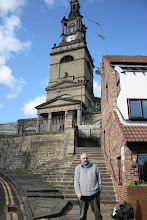I gave up biology at the age of thirteen, having to ditch it in favour of physics and chemistry, and history at what was then…in a more innocent age, called `O-levels’.
Sadly the glamorous world of animal science lost a razor sharp mind to the rather humdrum life of a radio journalist.
As a consequence I haven’t a clue whether it is badgers which cause the spread of Bovine TB amongst cattle, or whether cattle spread it to each other with badgers as collateral damage.
For farmers with cattle though the indisputable fact is that their animals are dying because of the disease… or more accurately because of the culling measures to control its spread. Just over fourteen thousand have been killed as a result of control measure in the first three months of this year alone. Ten years ago less than half that number were dispatched in the whole year.
And it costs money too. Last year about eighty million pounds to the taxpayer, and millions more to the farming industry.
The possibility of a link between badgers and the spread of bovine TB first emerged blinking into the daylight in the early nineteen seventies when a badger which had died from bovine TB was found on a farm in Gloucestershire, in an area with a high number of cattle infections, technically known as breakdowns. An extensive programme of badger culling followed in the area and bovine TB disappeared from there, at least for the next ten years.
There followed years of the kind of deliberations which make this country great… or not as some would see it. Inquiries, followed reviews which went hand in hand with investigations…. And then in the late nineteen nineties a trial was ordered to see what impact different culling regimes might have on the spread of the disease. The Krebs trial, overseen by John… now Lord Krebs, an eminent zoologist, involved splitting up areas where bovine TB was rife into three zones, known as triplets. In one zone all the badgers were culled, in another badgers were only killed where there were outbreaks of TB, reactive culling, and the third zone was used as a control where no badgers were culled.
The trial was seriously disrupted by the foot and mouth disease outbreak of 2001 when no testing could take place because of access restrictions to the countryside, and received another huge blow two years later when reactive culling was suspended because it appeared to make the problem worse by dispersing the sick badgers to other uninfected areas.
The Krebs trial or to give it it’s `Sunday Name’ the Randomised Badger Culling Trial was overseen by a group of independent scientists, the Independent Scientific Group ISG which was asked to analyse and draw conclusions from what information was available from the Krebs Trial. Under John Bourne a formerly Professor of Animal Health at Bristol University the ISG deliberated for nearly ten year, and concluded that although total or almost total elimination of badgers over a wide area might have a role to play in the control of bovine TB the type of local culls envisaged by farmers would result in the `control of cattle TB in a manner which is economically viable’
Just a matter of weeks after the ISG’s recommendations were published, Sir David King the government’s own chief scientist lobbed a hand grenade into the proceedings, saying badgers represented a massive reservoir of TB in the wild, and called for selective culls in areas affected by the disease.
Which is where it’s very useful to have a minister who actually has something enlightening to say, and my ears pricked up at this year’s annual general meeting of the National Farmers Union, where during a debate which he was actually chairing …. I can think of few other government ministers could pull that one off … Lord Rooker put his finger on the reason why it had taken so long to reach a decision on whether or not badger culling should go ahead.

Agriculture Minister Lord Rooker
My apologies if I didn’t get the exact wording of what he said but I think that’s a pretty accurate reflection. And it was fascinating, perhaps the government wasn’t scared of the public reaction to a possible cull, it was the likelihood that it would all end up in the courts, and if there’s one thing that politicians hate more than public disapproval of their policies, it’s the judiciary telling them they goofed.
Ironically as rumours of the government deciding against a cull start to circulate, so do rumours of possible legal action by the NFU. In the end the winners from bovine TB might turn out to be M’learned friends.





No comments:
Post a Comment